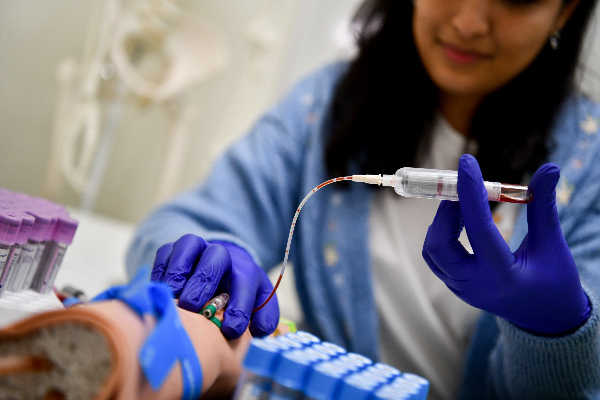Why take an intercalated degree?
- Courses leading to an intercalated degree offer students an excellent opportunity to think critically about, and to study more deeply, the scientific bases of the medical sciences. Experience has shown that those who have undertaken an intercalated degree gain a deeper knowledge of the underlying science as well as a greater understanding of their clinical studies.
- The medical course is by nature vocational, and therefore stress the basic aspects of the topics they cover. It provides students with a set body of well-established knowledge on which they can rely during their training, without going into either the controversies or experimental evidence behind many of the areas of knowledge.
- By studying for these courses you will be encouraged to pursue such ideas in greater depth. You will be taught by staff who have personal research experience in the topics and, therefore, speak with authority. There are also lectures by outside speakers and workshops where you can talk about new work.
- In addition, you will undertake a research project supervised by a member of staff. This will give you the chance to experience the excitements and the difficulties of research. This not only provides a stimulating and challenging period of your training, but the performance of a research project will give you a very good appreciation of whether you may wish to pursue a research career after the finish of your medical training.
Who can take an intercalated degree?
Applications to study will be considered from post 2nd/3rd/4th year medical students for an iBSc or post 3rd/4th year for an MSc (or equivalent undergraduate award in UK/EU countries) who have passed all years to date. This includes those who have previously undertaken an undergraduate degree unless that course was itself an intercalated degree. Students must have passed their current year to take up an offer of a place on an intercalated programme.
Approximately 25 - 30 places at external medical schools will be available to post 2nd, 3rd and 4th year Queen Mary students.
Please note all Queen Mary students must receive full written permission from the School of Medicine and Dentistry before they are permitted to intercalate. Full permission will be sent to students by the intercalated degrees administrator after the application period has ended in April/May 2023. Any prior permission should be considered provisional and liable to change until this has been received.
What intercalated B.Sc. courses are available?
There are 9 intercalated B.Sc. courses available at QMUL London campus:
M.Sc. Degrees for Intercalation
In addition, 20 masters (MSc) degrees have been identified as suitable for intercalation:
- M.Sc. Cancer & Clinical Oncology
- M.Sc. Cancer & Molecular and Cellular Biology
- M.Sc. Cancer & Molecular Pathology and Genomics
- M.Sc. Cancer & Therapeutics
- M.Sc. Clinical Drug Development
- M.Sc. Clinical Endocrinology
- M.Sc. Creative Arts and Mental Health
- M.Sc. Critical Care
- M.Sc. Mental Health: Cultural Psychology and Psychiatry
- M.Sc. Forensic Medical Science
- M.Sc. Gastroenterology
- M.Sc. Global Public Health and Policy
- M.Sc. Healthcare Research Methods
- M.Sc. Laparoscopic Surgery & Surgical Skills
- M.Sc. Neuroscience and Translational Medicine
- M.Sc. Regenerative Medicine
- M.Sc. Dental Materials
- M.Sc. Dental Technology
- M.Sc. Experimental Oral Pathology (Oral Sciences)
- M.Sc. Oral Biology
There is now a formalised process for taking up masters degrees (M.Sc.) during your intercalating year. However, it should be noted that these are extremely challenging degrees. As masters degrees are not necessarily just for intercalating students, you may find yourselves on courses with fellow students who have vocational experience as well as an academic interest in their field of study. The standard therefore is high. Only M.Sc. degrees advertised as suitable for intercalation should be considered. All degrees in this range have been adapted for intercalation.
The minimum entry requirement for our M.Sc. degrees will be 360 credits i.e. at least three years study on the MBBS/BDS course.
Also, the School will require written evidence that all academic assessment on an external masters course is to be completed prior to your return to the MBBS/BDS course so that student progression on the MBBS/BDS programme is not compromised by the intercalating year.
Students should also consider that, as master degrees are of 12 months duration, students requiring resits and /or retakes will only be permitted to do so at the discretion of the Dean for Education. Should a student fail an M.Sc. degree, the student would require approval for an interruption of studies of the MBBS/BDS, for the M.Sc. degree to be retaken. The rejection by a student of taking the year again would mean a failed M.Sc. but no further consequences for the MBBS/BDS.
Students wishing to intercalate onto our M.Sc. programmes from other countries than the UK may apply. Applications will be assessed by postgraduate admissions to ensure that the equivalency of a UK B.Sc. i.e at least 3 years, with sufficient credits at the appropriate academic level as set out by Quality Assurance Agency for Higher Education, would be attained before intercalation. The usual procedures for application will also apply.
You may also be interested in our MB PhD programme, which is designed for medical students, who are interested in clinical academic careers. You would join this 3-year programme after the third year of your MBBS Medicine degree to undertake a research-based PhD before returning to complete your MBBS degree. For more details visit the MB PhD web page or contact Cleo Bishop (c.l.bishop@qmul.ac.uk)
Note, offered courses may change ahead of the 2024 application period.
Fees
The home fees for intercalated B.Sc. programmes should be the standard undergraduate fees (amounts can be found via the Queen Mary Coursefinder). Fees for overseas students will not be announced until the January preceding the relevant academic year. For more information, please see the Tuition Fees and Funding page.
Note, all students intercalating on M.Sc. programmes will pay the standard M.Sc. course fees, as detailed under the relevant programme page on the Queen Mary Postgraduate course finder.
Should you have any queries, please contact the Fees Office:
Telephone: +44 (0)20 7882 7676
Fax: +44 (0)20 7882 3024
email: fees@qmul.ac.uk
Alternatively, contact Thuraisha Naidoo (t.naidoo@qmul.ac.uk)
What are the fees for Queen Mary, Malta students?
Queen Mary Fees Office will assess student fee status upon application to do an intercalating course.
Students deemed to eligible for “home fee” status will pay home fees for the year they are in London. International students will pay the standard iB.Sc. or M.Sc. fees for the London course as determined by their fee status, regardless of their fees for the Malta MBBS.
It is our understanding that Student Finance for England (SFE; or Wales, Scotland and NI) will not fund Home/EU students on the Malta programme wishing to intercalate in London. Students need to be studying at a UK institution to be eligible for funding and despite the connection to Queen Mary, the medical school in Malta would be classed as a foreign institution that students will be studying at for a period of five years. Students may make enquiries with SFE based upon their own circumstances, as factors may change and will depend upon the rules of SFE (or Wales, Scotland and NI) at the time.
Further information
Dr Rosalin Bonetta
Malta lead for Intercalated Degrees
r.bonetta@qmul.ac.uk
Dr. Jurgen Groet
Head of Intercalated Degrees
j.groet@qmul.ac.uk
Visit the Queen Mary campus webpage on intercalated degrees for further information.



